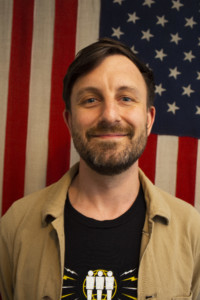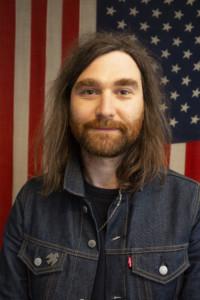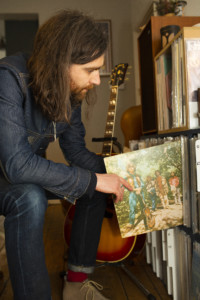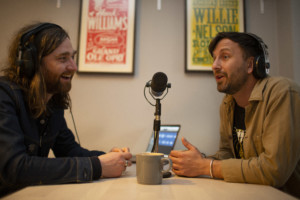Three years ago, a producer went for an interview with Hollywood director Cameron Crowe. As the story goes, it was going well. When wrapping up, Crowe asked, “What music are you into?” The man immediately whipped out his phone. “These two guys from England have this podcast, and I can’t get enough.”

“We should mention he got the job,” Gareth Ragg, from The Blues Kitchen Radio, tells me laughing. “Our listeners are not fair-weather; once you’ve got them, they keep coming back each week,” says his co-host, Liam Hart.
The producer eventually made it from Los Angeles to London to buy them a drink. He caught Hart as he was jumping down from the stage at The Blue Kitchen in Shoreditch, one of the venues the podcast is named after. “He went around all The Blues Kitchens every night, for four or five nights, until he found the one I was playing at.”

The Blues Kitchen Radio has been broadcasting for 12 years. Hart and Ragg recorded their first session in 2009, the same year the first The Blues Kitchen venue opened. The simple idea was to share the music and spirit of the bar with people who couldn’t make it in person. “Steve Ball, one of the owners of The Blues Kitchen, was astute enough to see if you searched for blues podcasts on iTunes, nothing came up. He saw a hole, and we filled it,” says Hart. Now they have up to 40,000 loyal listeners a week. “When we started, the only blues shows on the radio in England were dry as toast.” Hart continues, “We wanted to keep it raw and rough and real and ragged around the edges.”
Back in 2009, the podcast landscape was heating up. It was five years after the term had been coined in an article by Ben Hammersley for The Guardian. Ricky Gervais had phenomenal success with The Ricky Gervais Show, which by 2011 had had more than 300 million unique downloads. The Adam Carolla Show was also attracting significant listener figures, and the same year, The Joe Rogan Experience launched.
Hart and Ragg found themselves at the cusp of a burgeoning space of what USA Today called “free amateur chatfests.” But what has been the secret to their success? And how have they managed to broadcast weekly for twelve consecutive years?
Fanatical
Listening to the podcast is like listening to two music-obsessed old friends, because that’s exactly what it is. Hart and Ragg met at high school in Old Buckenham, a small city in Norfolk, England, with a population of under 1,500. Ragg recalls, “We met through music. We did a Cat Stevens gig after school.” Hart chimes in, “I thought it was Oasis.” Ragg explains, “That came after.”
This was in 1999 when Brit Pop was waning, and dance music and mainstream pop were taking over. It was the year that Vengaboys released ‘We are going to Ibiza,’ and Christina Aguilera sang about a genie in a bottle that you had to rub the right way.
“We grew up at a time when music was your identity. There were lots of kids that were into dance music—that whole Ibiza thing was happening. And pop was big; the Spice Girls were huge. By the time we got to Oasis—which I remember buying alongside Bon Jovi—we were a bit late to the party,” Hart says. “But it wasn’t like now when everyone moves on so quickly. I was still in love with Oasis and bands like Ocean Colour Scene. In interviews, they talked about Neil Young and The Rolling Stones, which became the gateway to everything else. You go from Oasis to The Beatles. The Stones to Chuck Berry and T-Bone Walker. Very quickly, it went from being a casual interest in contemporary music to an obsession with 60s garage and blues music,” says Hart.
The podcast they make is an ode to this research; they play everything from 1930’s Delta Blues through gritty southern soul, funk, folk, rock n roll, and new releases. Refusing to play the same song twice, apart from the Christmas special, listening is all about discovery.
To select the songs, Ragg explains, “I have a long list of everything I’m listening to, then throughout the week, I start dropping songs into our shared playlist.” Hart works part-time from an office above The Jazz Cafe in Camden, an iconic London live music venue, “the variation of music that comes through the speakers in that room is bananas; I pick up a lot there.” Recommendations also come from listeners, “whether it’s new stuff, a song that’s meant a lot to them, or something they listened to in the car…on an amazing road trip. More often than not, the songs that people are requesting are so in line with what we are listening to because people get it,” says Ragg.
Ragg and Hart share an unabashed open-mindedness that is not always there in music aficionados; a desire to share and geek out. They trace it back to experiences like their first time at Glastonbury, the legendary British music festival. “We were a 15 and 16-year-old from Norfolk, who had only ever been to about 10 gigs and there are 150,000 people that feel exactly the same way about music as you do,” remembers Hart. It was 2003, and they saw Supergrass, The Coral, and Radiohead. “I honestly don’t think we could have got better than that,” Ragg exclaims. “We’d died and gone to heaven,” says Hart. “It was fanatical.”
Mental health
Upon starting the podcast, they realized that they had to be consistent to build up their audience. At first, they were broadcasting every couple of weeks, and “within a few weeks,” Ragg shares, “we could see we were getting the listeners, and people were buying into it – people were emailing in. So then it became every week.” It was this routine that differentiated them from other podcasts. At the time, “podcasting was still relatively amateurish. Lots of people were starting and then not following through. Doing it weekly, from a very early point was so key to building our audience over that first decade,” Ragg tells me.
This continuity also had a broader personal impact. When Hart suffered from a period of challenging mental health seven years ago, the podcast helped. He shares, “before I returned to the office, getting back into the routine of podcasting was the beginning of my way out of the darkness.”

Listeners have also made the podcast something to cling to throughout difficult times in their lives. Hart says, “we’ve had people get in touch, especially throughout the pandemic, saying they have been counting down the minutes to when the show comes out on a Monday because it’s the highlight of their week. Some people have told us that if it wasn’t for the show, they don’t know if they’d be here.”
Routine is proven to be essential to mental health. Verywell Mind reports that routines can lower stress levels, improve health, and boost focus. Most importantly, it allows you to bring yourself back to living in the moment. Hart explains, “I didn’t realize at the time quite the good it was doing. When you’re down, depressed and anxious, it’s tough to enjoy things and take them in because your mind is so occupied. Forcing myself to go back to podcasting was definitely a major part of coming out of that hole.”
Authenticity
How do you measure the success of a passion project? Ragg and Hart tell me that the most meaningful thing to come from their show is their relationship with one another. Hart shares, “it gives us a great reason to hang out every week, it’s time to catch up, and it means that we have a weekly space where our friendship remains completely intact.”

Ragg wanted to be a broadcaster in mainstream radio. Instead, he has a successful career in corporate events. “But I don’t worry about that,” he says. “I’m doing something I am passionate about on my own terms, with my best mate.” Hart adds, “I’m very proud of the fact that people come to us, and they trust our opinion on what music they should be listening to.”
It has scratched an itch for them both and enabled them to stay close to the musicians they have idolized since they were teenagers. They frequently have huge guests on the show, including Ronnie Wood, George Clinton, Bobby Gillespie, Seasick Steve, and Wayne Kramer from MC5. When interviewing people, Hart says, “I can’t help but be that 14-year-old boy again.” They also have gained a reputation for their vast music knowledge and artists now seek them out to appear on the show.
It might seem, with ever-growing listener figures and such acclaim throughout the music industry, that they would monetize the project. But no, “this is my hobby, I’d rather that than having to worry about it and worry about being paid,” Ragg says. “Why alienate listeners with adverts?” Hart asks.
In an age of capitalist production, it is refreshing to learn about Hart and Ragg’s dedication to authenticity. They are adamant they don’t want to sell out, and when listening to The Blues Kitchen Radio, you can feel that it is all soul and love. It’s just two best friends geeking out about their favorite music like they have since they were teenagers.
Comments